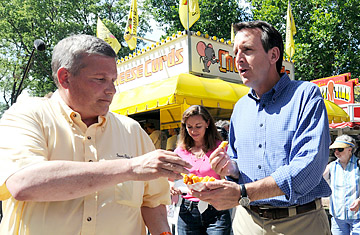
(2 of 2)
The arrival of the Progressive Era sounded the eventual death knell of candidates anointed only by party elites. The crusading reformist Democratic politician William Jennings Bryan became the first presidential candidate to embark on a national stumping tour when in 1896, he preached the cause of ending the gold standard to ease the debt burden carried by the country's farmers. "The long campaign is absolutely a result of the progressive movement, and along with it came referendums, women's suffrage and, yes, primaries," says Lichtman. Having already served two terms as President, Theodore Roosevelt returned in 1912 to pose a primary challenge to Republican President William Howard Taft, whom Roosevelt had come to view as insufficiently progressive. Roosevelt failed to defeat the party candidate, but his insurgent run set in motion the primary campaign, which had never before occurred and which extended the election calendar even earlier.
It would take another nationwide cause to topple the last vestiges of the speedy candidacy. When the U.S. escalated its conflict in Vietnam under Lyndon B. Johnson, the Democrats became known as the party of war. As the baby-boom generation became eligible to vote, its peacenik members lined up behind two antiwar candidates within the party, Eugene McCarthy and Robert F. Kennedy, setting up a vicious intraparty squabble. Too worn down to carry on, sitting President Johnson opted against running for re-election in 1968. But despite the grass-roots candidacies electrifying the antiwar movement, Vice President Hubert Humphrey was picked by the Democrats in Chicago to be the 1968 nominee without ever having actually competed in any of the open primaries (there were only 17 held across the country that year).
"As a sop to the progressives after Chicago, the party bosses created the Committee on Party Structure and Delegate Selection, a.k.a the McGovern Commission, and with it ushered in the universal primaries," says Lichtman. As a leader of the commission, George McGovern understood that the new electoral reality placed a premium on slogging through the state-by-state primary process, now set in place throughout the union. Four years later, a relative unknown named Jimmy Carter camped out in Iowa and won the caucus, kicking off his nomination victory. "Carter set the precedent," says Larry Sabato, the director of the Center for Politics at the University of Virginia. "You needed two years, and you needed to live in Iowa and New Hampshire."
Because the onetime peanut farmer was then so obscure, most experts agree, Carter would have been far less likely to win the nomination under the old model, under which not as many contests were staged. But he pulled into New Hampshire with a win already in his pocket, having claimed victory in Iowa. Carter then won New Hampshire, which had started convening the U.S.'s first-in-the-nation primary in 1952. With the country hardly a decade removed from Jim Crow, Carter, a Southern white governor, was able to prove his viability outside the deep South.
That narrative helped Iowa and New Hampshire solidify their status not just as early bellwethers but also, more important, as microcosms for the country at large, where candidates must prove their national viability and electability. After allegations of marital infidelities came to light in 1992, Bill Clinton debunked the notion that the scandal was an insurmountable obstacle when he finished second in New Hampshire, memorably calling himself the "comeback kid." And Obama's candidacy took off only once he won the 2008 Iowa caucus and demonstrated that he was capable of winning among whites.
Intent on holding on to its status as a national kingmaker, New Hampshire moved its contests up from the middle of March, when they'd been held since 1952, to the beginning of January in 2008, further extending the campaign cycle. "This is the greatest show on Earth," says Norton Smith. "With the 24/7 [news] cycle, the media have helped to turn this into a long-running drama."
As a testament to the two states' prominence, candidates continue to arrive in Iowa and New Hampshire earlier and earlier each election cycle, knowing full well that actual retail politicking can make the difference on these small but significant stages. John McCain spent so much time in New Hampshire — whose primaries he won in 2000 and 2008 — that he's said to have earned favorite-son status. Indeed, before winning the 2008 primary, McCain conducted more than 100 of his signature town-hall meetings. For his part, Connecticut Senator Chris Dodd decided to enter his kids into the Iowa school district after moving his family to the state while running for the 2008 Democratic nomination.
Each ensuing election is an opportunity to up the financial ante. More than 10 times as much money ($1.74 billion) was spent on the 2008 election as on the 1980 race ($161 million). Moreover, Bill Clinton's innovative use of a "war room" for rapid response in 1992 enhanced the full-time professionalism of presidential campaigning, and his tactics have been improved upon by the teams of George W. Bush and Obama. "It's just like the old missile war between the U.S. and U.S.S.R.," says Sabato. "It's an unlimited quest for new ammunition." The guns for the 2012 campaign, it seems, are already getting loaded.
